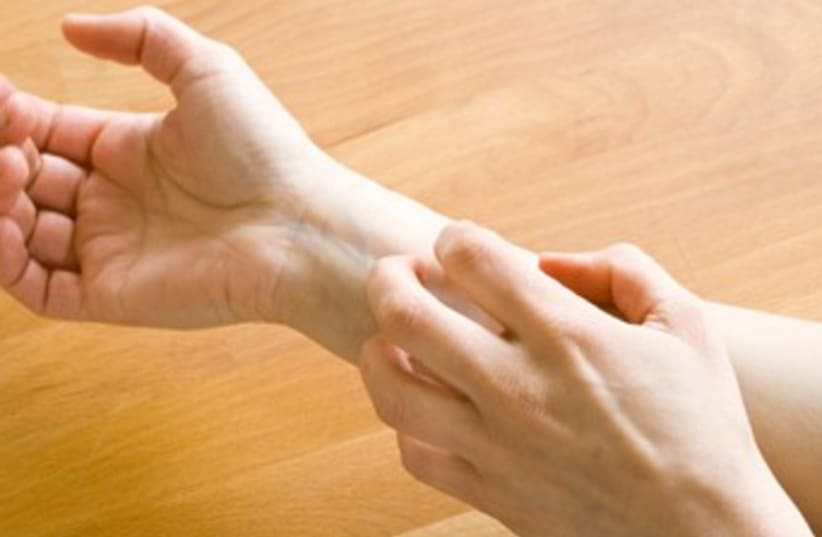Q. Dear Natalie, since you are a Homeopathic Practitioner, can you recommend any good homeopathic remedies to treat eczema?
A. Homeopathic remedies are prescribed according to the individual’s symptoms. Since no two people have exactly the same kind of eczema, I have found astonishing results with the use of accurately prescribed Homeopathy. The following four scenarios will give you a brief indication of which remedy may be best suited for you. Since the repertoire of homeopathic remedies is so extensive, I still recommend finding an experienced homeopathic practitioner who can prescribe the correct remedy to suit your specific type of eczema. The homeopathic remedy Arsenicum is usually prescribed for someone who's eczema is so itchy that the sufferer scratches the area until it’s red, raw and often burning. The person also feels physically weak and cold. The sufferer also has many fears and anxieties and is prone to restlessness. Symptoms are worse after midnight, when getting wet or when cold. Symptoms are improved in warm rooms.The person usually in need of the homeopathic remedy Sulphur is prone to skin disorders in general. The eczema is intensely itchy, has eruptions that ooze foul-smelling pus and the patient may scratch until the point of burning and bleeding. The eczema tends to worsens when exposed to wool, in warm settings, while bathing, at night and around heat. The condition improves with cold water applications. The areas that are most commonly affected are those that typically sweat; including the feet, the face, the knees, and the hairline. The personality here although often intellectual, may be lazy and unconcerned with appearance.I will prescribe the homeopathic remedy Graphites to eczema that shows pronounced red, itchy spots that produce honey-like pus. The patients skin tends to be course, thickened and cracked , especially on the heels. The eczema is worse with heat and at night. Cold compresses usually improve the eczema.Lastly, NatrumMuriaticum is indicated when the eczema has small and itchy blisters that produce a caustic pus, making the affected area raw. The person will be very thirsty and crave salt. Emotionally, there is unresolved or suppressed grief, and yet the person does not like consolation when sad. Symptoms are worse around warmth, during menstruation, and when eating salt.Q. Dear Natalie, I am in desperate need of some natural remedies that I can apply topically to my eczema which is getting worse in the heat of the summer. Please help! Yours gratefully.
A. I would begin by paying attention to personal triggers such as certain foods, skin irritants and allergens that are affecting your symptoms. Also important is keeping your skin cool and moisturized. Try to avoid hot baths and showers, harsh soaps and try to reduce scratching effected areas of the skin.The following topical herbal remedies should help act as palliative treatment while homeopathy can treat and cure the underlying cause of the eczema itself. Chamomile topical creams are wonderful at working to relieve inflammation and suppress an overactive immune response. The University of Michigan records a 1985 clinical trial in Germany which found that chamomile cream was nearly as effective as 0.25-percent hydro-cortisone cream. Search for a cream with Chamomile to relieve the burning or itching associated your eczema.Chickweed cream also has similar effects to topical hydro-cortisone. Chickweed cream helps cool the itching and helps to promote healing. Creams containing the plant St. John's wort also have anti-inflammatory benefits as well as anti-bacterial effects. There was a double-blind study published in Phytomedicine in 2003 which found that St. John's wort was significantly more effective than the placebo cream in reducing eczema symptoms. I suggest using a cream containing five percent St. John's wort standardized to contain 1.5 percent hyperforin and use twice daily.This column is brought to you as general information only and unless stated otherwise is not medical advice nor is it based on medical experiments. This column is not a substitute for medical advice or treatment for specific medical conditions. For more information about specific problems, please contact a doctor.Natalie runs a clinic both in Tel Aviv and Jerusalem offering a wide range of natural treatment, including a women’s clinic every Wednesday. Healing is achieved using homeopathy, reflexology, massage, flower remedies and nutritional wisdom.
To make an appointment please email nateopath@gmail.com.
Ask Natalie: If you have a health query and would like an alternative answer then email Natalie with your question at nateopath@gmail.com.
Someone Once Said: “While we may not be able to control all that happens to us, we can control what happens inside us” - Ben Franklin
Follow @JPost_Lifestyle
